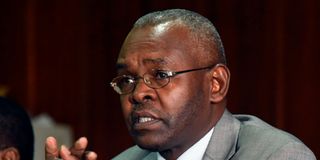Kamau Thugge: Insider with a taste for governance reforms primed for CBK top job

Kamau Thugge during a past event.
Former Treasury Principal Secretary Kamau Thugge’s swift return to the heart of the country’s fiscal and monetary policy decisions nears completion following his nomination as the next Governor of the Central Bank of Kenya(CBK) by President William Ruto.
Although already in an influential role as the President's fiscal affairs and budget policy advisor, his highly likely endorsement by Parliament as the next CBK boss would wrap up a fairy-tale comeback for the man referred by close peers as a “soft-spoken gentleman of the Treasury” who only two years was bundled out office on economic crime allegations and had to trot through the corridors of justice to clear his name.
It would also mark a back-to-back occupancy of the CBK Governor's office by ex-International Monetary Fund(IMF) officials. Before joining the Ministry of Finance, Dr Thugge worked with IMF as an economist, senior economist, and deputy division chief.
The outgoing CBK governor Patrick Njoroge was also a former IMF adviser when he was appointed governor on June 26, 2015, and served for a four-year term before being handed another term by former President Uhuru Kenyatta in June 2019.
For Dr Thugge, it will be a familiarity with the workings of the country’s fiscal and monetary space. He has worked in the Ministry of Finance in various capacities, among them as the Principal Secretary(PS), head of the Fiscal and Monetary Affairs Department, economic secretary, and senior economic adviser.
From 2013 when then President Kenyatta named him as PS following the elevation of Joseph Kinyua as head of the public service, Dr Thugge has enjoyed a bird’s-eye view of Kenya’s economy and its pulses for six years until he was bandied out on graft claims in 2019 over a dams’ scandal but cleared by the court in 2021.
A lengthy tour of duty with the IMF adds more feathers to Dr Thugge’s cap as he expected to help negotiate and renegotiate the financing pacts for a country in dire need of financing but hard saddled by huge debt.
Notably in his workings at the IMF, Dr Thugge was a staunch advocate of using donor aid to strengthen institutions and governance systems in poor countries to curb donor dependence.
“Given, however, the pressures on aid budgets in major donors, which are likely to continue for the foreseeable future, continuing aid will be most effective if it catalyses private financial inflows, particularly investment,” he said in an IMF policy paper he co-authored on debt relief for low-income countries and heavily indebted poor countries(HIPC).
“This suggests a focus on institution building necessary to attract such private investment as well as support for putting in place necessary infrastructure: many HIPCS face serious infrastructure and institutional problems. Some HIPCS also need to address problems of governance, particularly as they influence investor confidence, such as the establishment of judicial systems, and effective application of the law” he added.
Locally, some of Dr Thugge’s high moments in his career include his role in influencing the design of Kenya’s current fiscal decentralisation system.
He also coordinated the formulation of legislation for implementing devolution, The Commission on Revenue Allocation Act 2011, the Independent Officers (Appointment) Act, 2012, the County Government PFM Transition Act 2013, County Allocation of Revenue Bill 2013, and the Division of Revenue Bill 2013/2014.
If successful, Dr Thugge will be the 10th boss of CBK which was established on September 14, 1966, as the banking sector regulator.
Past CBK governors include Leon Baranski, Duncan Ndegwa, Philip Ndegwa, Eric Kotut, Micah Cheserem, Nahashon Nyagah, Andrew Mullei, and Njuguna Ndung'u. Dr Njoroge’s successor will be appointed for a term of four years, renewable once, subject to performance.
Dr Thugge was shortlisted for interviews for the CBK top job alongside five other candidates including Dorcas Mutonyi, Haron Sirima, Edward Sambili, Nancy Onyango, and Adan Mohamed.
The exiting CBK governor leaves behind a mixed legacy. Dr Njoroge oversaw the introduction of a cap on interest rates through the Banking (Amendment) Act, 2016, which came into force on September 14, 2016. Just two years later, CBK’s study on the rates cap found they had harmed the economy as banks shunned lending to individuals and businesses in favour of lending to the government. The caps were removed in November 2019.
This year, Dr Njoroge has faced challenges propping up Kenya’s foreign reserves.





